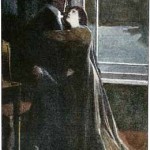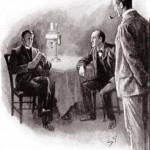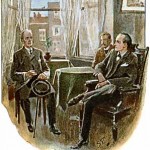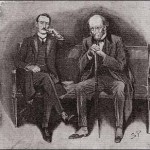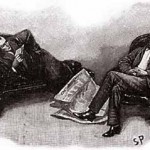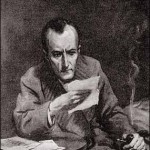“Singular, no doubt–and yet he did so.”
“Every inquiry in this case reveals something inexplicable. Now there are three papers still missing. They are, as I understand, the vital ones.”
“Yes, that is so.”
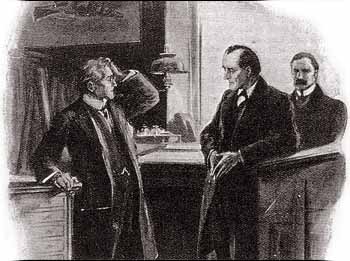
“Do you mean to say that anyone holding these three papers, and without the seven others, could construct a Bruce-Partington submarine?”
“I reported to that effect to the Admiralty. But to-day I have been over the drawings again, and I am not so sure of it. The double valves with the automatic self-adjusting slots are drawn in one of the papers which have been returned. Until the foreigners had invented that for themselves they could not make the boat. Of course they might soon get over the difficulty.”
“But the three missing drawings are the most important?”
“Undoubtedly.”
“I think, with your permission, I will now take a stroll round the premises. I do not recall any other question which I desired to ask.”
He examined the lock of the safe, the door of the room, and finally the iron shutters of the window. It was only when we were on the lawn outside that his interest was strongly excited. There was a laurel bush outside the window, and several of the branches bore signs of having been twisted or snapped. He examined them carefully with his lens, and then some dim and vague marks upon the earth beneath. Finally he asked the chief clerk to close the iron shutters, and he pointed out to me that they hardly met in the centre, and that it would be possible for anyone outside to see what was going on within the room.
“The indications are ruined by three days’ delay. They may mean something or nothing. Well, Watson, I do not think that Woolwich can help us further. It is a small crop which we have gathered. Let us see if we can do better in London.”
Yet we added one more sheaf to our harvest before we left Woolwich Station. The clerk in the ticket office was able to say with confidence that he saw Cadogan West–whom he knew well by sight–upon the Monday night, and that he went to London by the 8:15 to London Bridge. He was alone and took a single third-class ticket. The clerk was struck at the time by his excited and nervous manner. So shaky was he that he could hardly pick up his change, and the clerk had helped him with it. A reference to the timetable showed that the 8:15 was the first train which it was possible for West to take after he had left the lady about 7:30.
“Let us reconstruct, Watson,” said Holmes after half an hour of silence. “I am not aware that in all our joint researches we have ever had a case which was more difficult to get at. Every fresh advance which we make only reveals a fresh ridge beyond. And yet we have surely made some appreciable progress.
“The effect of our inquiries at Woolwich has in the main been against young Cadogan West; but the indications at the window would lend themselves to a more favourable hypothesis. Let us suppose, for example, that he had been approached by some foreign agent. It might have been done under such pledges as would have prevented him from speaking of it, and yet would have affected his thoughts in the direction indicated by his remarks to his fiancee. Very good. We will now suppose that as he went to the theatre with the young lady he suddenly, in the fog, caught a glimpse of this same agent going in the direction of the office. He was an impetuous man, quick in his decisions. Everything gave way to his duty. He followed the man, reached the window, saw the abstraction of the documents, and pursued the thief. In this way we get over the objection that no one would take originals when he could make copies. This outsider had to take originals. So far it holds together.”
“What is the next step?”
“Then we come into difficulties. One would imagine that under such circumstances the first act of young Cadogan West would be to seize the villain and raise the alarm. Why did he not do so? Could it have been an official superior who took the papers? That would explain West’s conduct. Or could the chief have given West the slip in the fog, and West started at once to London to head him off from his own rooms, presuming that he knew where the rooms were? The call must have been very pressing, since he left his girl standing in the fog and made no effort to communicate with her. Our scent runs cold here, and there is a vast gap between either hypothesis and the laying of West’s body, with seven papers in his pocket, on the roof of a Metropolitan train. My instinct now is to work from the other end. If Mycroft has given us the list of addresses we may be able to pick our man and follow two tracks instead of one.”
Surely enough, a note awaited us at Baker Street. A government messenger had brought it post-haste. Holmes glanced at it and threw it over to me.
There are numerous small fry, but few who would handle so big an affair. The only men worth considering are Adolph Mayer, of 13 Great George Street, Westminster; Louis La Rothiere, of Campden Mansions, Notting Hill; and Hugo Oberstein, 13 Caulfield Gardens, Kensington. The latter was known to be in town on Monday and is now reported as having left. Glad to hear you have seen some light. The Cabinet awaits your final report with the utmost anxiety. Urgent representations have arrived from the very highest quarter. The whole force of the State is at your back if you should need it.
Mycroft.
“I’m afraid,” said Holmes, smiling, “that all the queen’s horses and all the queen’s men cannot avail in this matter.” He had spread out his big map of London and leaned eagerly over it. “Well, well,” said he presently with an exclamation of satisfaction, “things are turning a little in our direction at last. Why, Watson, I do honestly believe that we are going to pull it off, after all.” He slapped me on the shoulder with a sudden burst of hilarity. “I am going out now. It is only a reconnaissance. I will do nothing serious without my trusted comrade and biographer at my elbow. Do you stay here, and the odds are that you will see me again in an hour or two. If time hangs heavy get foolscap and a pen, and begin your narrative of how we saved the State.”

